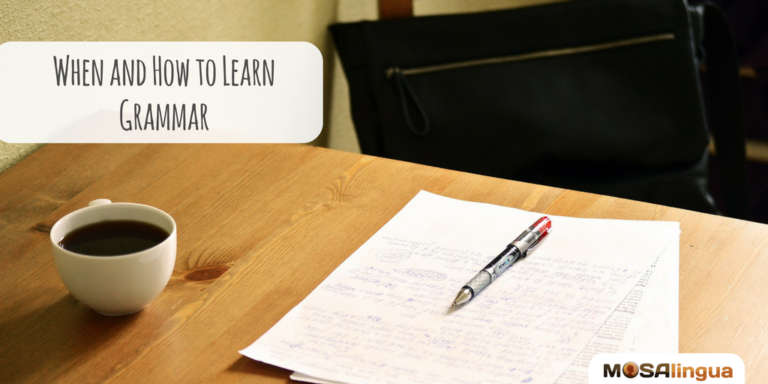The matter of when and how to learn grammar is a defining characteristic of each method of learning a foreign language:
• On one hand, high school and university courses focus a LOT on grammar rules. Typically you will start to learn grammar within the first week or two of classes.
• On the other hand, alternative methods try to reproduce the process with which infants and children learn their native language. These methods try to reduce the role of grammatical concepts and, if possible, remove them from the learning process altogether.

When and How to Learn Grammar
As with most things in life, you need to find the perfect balance between two extremes.
Of course, overburdening students with complex grammar rules from the start is discouraging, counterproductive and, put simply, quite boring. I once had a Spanish professor who made me hate the language, because she inundated us with grammar drills. But after studying the language using my own method, I’ve come to love it today.
That said, grammar is something you’ll have to learn eventually. If you don’t, you will be deprived of a powerful tool that allows you to understand the structure and logic of a language. It’s also worth mentioning that while children begin learning their language before starting school, it’s their implicit knowledge of grammar rules that allows them to express themselves effectively in speech and in writing.
This realization is what encouraged me to call this article “When and How to Learn Grammar.” Honestly, I have no straightforward answer, but I hope this article will help both of us learn grammar on our own terms.
A Matter of Time and Objective
Anyone who is compelled to embark on the quest of learning a language must answer the following questions before doing anything else:
• Why am I learning this language?
and…
• How much time can I dedicate to learning it?
As my regular readers know, I recently began learning Portuguese. So, before I started, I asked myself:
• Why do I want to learn a foreign language (in my case, Portuguese)?
I decided that my goal was to open new doors on my travels and in my interactions with native speakers.
• How much time do I have available?
I have less than 3 months, and about 15 minutes a day to devote to this task.
Considering the time I had available to learn Portuguese, it would be ridiculous for me to think that I could master the language, given my constraints. Furthermore, my goal was to understand and be able to use Portuguese, fast. I know my Portuguese isn’t perfect, but that’s OK. My mistakes generally don’t affect people’s ability to understand me, and they don’t discourage me from continuing to learn the language.
After starting to express myself, and having learned enough day-to-day words and phrases, it’s time to perfect my skills and face the task of learning some grammar (which will certainly have to wait until the holidays).
But that’s just me. You should also take into consideration the example of a college student who, after studying the language for four years, wants to become a translator. Their goal and time frame are very different from mine. Even though I don’t suggest diving in right away and starting to learn grammar from day one, eventually, it will take up a sizable amount of your time and energy.
To Each Their Own Style, To Each Their Own Method
There are those who like to organize what they learn. They lay down a foundation, develop patterns and discover rules. Other learners work better with improvisation and spontaneity. If either student were to learn grammar too early, it would be detrimental to their success.
In my opinion, I think I fit somewhere in between both styles. I like being spontaneous at first, exposing myself to the language naturally and memorizing words and phrases. Then I go through a “consolidation” phase, during which I use specific rules to perfect the patterns that I’ve observed. Each person needs to find the method that’s most useful for them.
Obsession with Perfection Can Hinder Expression
One day, Cinzia, a friend of mine with a degree in Japanese, told me something that left me touched. During her year working in Japan, she met some French and Italian people who were also there for work. They spoke Japanese without ever having picked up a grammar book. Their Japanese wasn’t perfect, but they spoke so naturally that, after two years of studies, it made her head spin a thousand times over before she could even open her mouth to reply. While grammar can be an obstacle in expressing yourself, it will prove to be useful later on.
Luca’s Tips on When and How to Learn Grammar
We want to leave you with a video about Luca’s personal experience with this topic. He explains when the best time to learn a language’s grammar is (in his opinion), and one possible way to go about doing it.
The video is in English, but you can turn on subtitles in one of 6 languages. Watch it on YouTube, or just scroll down. Then, subscribe to our channel for more tips like these and other videos about language learning.
Also, many of our apps have optional grammar categories. Check them out if you feel like you’re ready to delve into that part of the language you are learning.
To summarize, if being able to speak a language fast is a goal of yours, don’t worry. You don’t need to learn grammar right from the get-go. Mistakes have their place in language learning. Does the immediate attainment of perfection? No.
I hope you enjoyed this article on when and how to learn grammar! If you did, share it with your friends 🙂
Related posts:
Start learning a new language today

Good news: we can help!
More good news: you can get started for free! Start your free trial now and for the next 15 days, take advantage of the most effective language learning method on the market!
Vocabulary flashcards, videos with subtitles, audiobooks, articles adapted to your level – with MosaLingua Premium (Web & Mobile), you’ll have access to all this and more. Get started right now. It’s free—and risk-free—to try!






Hi Luca
I couldn’t find the next article you mention at the end. Has it already been published?
Hi Benjamin,
Thanks for your comment ?
Not yet, but we are going to translate it soon.
Cheers,
Luca